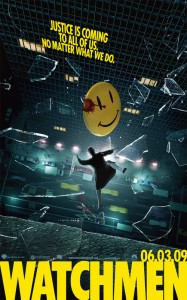
Whilst it can be said of pretty much any work of literature, WATCHMEN is a book that is defined by those that have read it and those that haven?t. To clarify, those that have read Alan Moore and Dave Gibbon?s 1985 magnum opus (myself included) are typically fiercely in love with the piece, often to the point of obsession. Converts harp on about the intertwining narratives, the rich psychology of the characters ? the sheer depth and quality of the thing. As for the rest of the population, people who have no idea who Rorschach is or why it matters that the Comedian is dead, WATCHMEN, until recently, probably wasn?t even on the radar. You might have heard of it in passing, but that would be it.
With the arrival of Zack Snyder?s big budget rendering of the graphic novel, WATCHMEN has become front page news. People who didn?t before know about it now, thanks to posters, teasers and Smashing Pumpkins infused trailers that have flashed across global screens since THE DARK KNIGHT conquered the world in July. Meanwhile, devotees of the graphic novel either revel in the books newfound cool or get a knotted sense of fear in their stomachs, imagining their prised tome being mangled by corporate Hollywood. Suddenly, WATCHMEN is everywhere, and everyone seems to have some sort of opinion on the film. To all intents and purposes, the film has been subsumed into the mainstream before anyone has even seen it – which is fascinating, because the movie is arguably one of the least accessible, least straightforward blockbusters a major studio has ever put out.
Set in an alternate 1985 where now outlawed superheroes once kept the peace and Richard Nixon is enjoying a third term in the White House, WATCHMEN is a dense, visually rich picture that demands the viewer pays attention. In general, the casting is great – Jackie Earl Haley as Rorschach, Patrick Wilson as Nite Owl and Jeffery Dean Morgan as the Comedian are pretty much bang on what their characters needed to be. Billy Crudup is suitably detached as Doctor Manhattan, but effects wise the character didn?t always hit the mark, oddly working far better close up than in long shot. When it counts however (in a pivotal scene on Mars, towards the end of the movie) Crudup?s acting coupled with the work of the special effects boys produce something truly brilliant. Malin Ackerman as Silk Spectre II and Matthew Goode as Ozymandias are certainly the weakest of the group, but still perfectly acceptable in their roles. Supporting players were equally as good, but the film loses credibility any time a character in old age make up appears on screen ? the prosthetic work on WATCHMEN is truly dire, rendering Richard Nixon – a minor, yet key character, difficult to take seriously. Luckily, these effects are not leant on too hard by the movie, and don?t take much away overall.
For the initiated viewer who has already read the book the first twenty to twenty five minutes of the movie are pretty much bang on perfect. The feel, history and story of the original text are replicated almost perfectly – I was grinning from ear to ear throughout the five minute long title sequence accompanied by Bob Dylan?s ?The Times They Are a- Changin??, enthused with the sense that Snyder had done the impossible and captured the essence of WATCHMEN and committed it to celluloid. The main source of enjoyment in the opening scenes was the overwhelming sense that WATCHMEN was being done right.
The extraordinary fealty to the original text marks this movie out from not just other comic book adaptations, but book to film adaptations in general. And, for the most part, WATCHMEN the film is unbelievably faithful to WATCHMEN the graphic novel. I say ?unbelievably? because there was no serious reason for the seasoned movie goer to suppose that a book of this complexity and depth would be put on screen so literally in a major studio movie. Zack Snyder has used possibly all the capital he had with 300 to get this movie made ? allegedly the studio wanted to cut out diversions to Mars and Antarctica, and go for a more simple, closed off ending. Snyder battled for the original ? and won. As a result, if you have a favourite scene from the book, it?s almost certain that it?s in here in some form. Crucially, Snyder has avoided the sense that he was just ?ticking the boxes? and getting favourite scenes in the right order. This was a problem that beset THE GOLDEN COMPASS ? a film where everything I loved in the book was there, but felt homogenised, flat and soulless. WATCHMEN largely follows the books structure, and events happen in a similar order as well, but the film has some kind of grungy, quasi-noirish feel and mood to it, a sense that Snyder doesn?t just want to rush to the next cool bit.
However, whilst I believe the film does have a mood and a feel to it ? WATCHMEN does lack a really strong, overall tone. It?s been noted elsewhere that for a film about Cold War paranoia, WATCHMEN lacks a sense of dread and fear, and whilst I didn?t really register this when I left the IMAX after seeing the movie, in retrospect it was a major element of the novel the film failed to translate onto the screen. The film looks gorgeous, the characters (to a large extent) are analogous to their two dimensional incarnations, but crucially, there is no strong sense of threat that ties everything together. The audience should feel the palpable fear of nuclear war, the graveyard stench that pervaded so many lives in the 1980s. Snyder battled to keep the period setting, yet strangely never gets close to using it to its full potential. Arguably this comes from the necessary pruning of supporting characters ? Rorschach?s psychiatrist, a New York news vendor and his young customer, a pair of bickering lesbian lovers ? characters that didn?t add to the overall plot, but elegantly constructed a mood of fear in relation to the mutually assured destruction of global nuclear war. They were normal people, scared shitless that they could be blown to bits in the next five minutes. And whilst their exorcism is perfectly understandable in the context of an already long film, it leaves WATCHMEN feeling a little toothless. I would argue that this question of tone is the reason so many reviewers have struggled to pin down their views on this movie. Struggling to identify the lack of a strong, overall tone is a nebulous, elusive thing to do, and working out what is wrong with WATCHMEN ? a film that broadly gets so much right ? is a hard thing to do, especially when that problem is an abstract feeling.
But potentially more problematic is the issue that, as a movie, in the conventional sense, WATCHMEN just doesn?t work. The movie is a quite literal rendering of the comic book on the big screen. The book employs a jumbled, twisting narrative, flashing backwards and forwards through time, wholly at odds with the traditional three act, single central storyline format we expect from modern cinema. To try and explain, I?ll try and use a metaphor – I?ve always compared the experience of reading WATCHMEN the graphic novel as something akin to walking down a busy street with market stalls on either side. Essentially you start at one end of the street and walk along it to the other end, but along the way you look at different stalls, sometimes turning back, sometimes moving ahead. Occasionally you might visit the same stall twice, approaching from a different direction, or sometimes you might miss a stall entirely. This approach is fine for a comic book ? you can afford to jumble the story when you can flip back a page or two to check things out. But a movie can?t work like that for obvious reasons. Returning to the street market analogy, the best, or at least the established way to tell a story on film is to start at one end of the street, progress forwards, get what you need from each stall, one after the other and reach the end of the road without moving forwards too quickly so you overlook something or tracking back on yourself and ruining your forward momentum.
A lack of momentum, a sense that one scene is a logical progression of the last, is a major issue in WATCHMEN, perhaps the major issue. Sticking so closely to the style of the source material means that the movie frequently stops dead, putting the central story (who killed the Comedian and why) on hold, stepping back and dealing with the back story of each of the key characters in turn. In a comic book, this works ? a graphic novel can drop in and out of the story as the need to get things over and done with in two and a bit hours isn?t an issue on the page. But elegiac, poetic portions of the book ? Doctor Manhattan on Mars for example ? feel in the movie like they are bloating an already busy story. Whilst Manhattan?s ?birth? is a fascinating, intellectual conceit, it seems extraneous, battling against the way we know a movie is supposed to work. The side-steps through time, the backwards and forwards storytelling, ends up weighing things down, rather than adding a sense of richness and quality that they did in the book.
Having said all that, I?m now going to completely contradict myself, as WATCHMEN?s greatest strength is how faithful it is to the book. Whilst it doesn?t work as a film in the typical sense, WATCHMEN is a great adaptation of an awe inspiring piece of literature. As a literal example of WATCHMEN the book ripped from the page and jammed onto the screen to see what sticks, an example of a film ignoring the conceits of mainstream storytelling because that?s not what the book does, this is great stuff. So much has been retained or hinted at from the original work that it can?t possibly be appreciated in a single sitting. The movie doesn?t always feel like the WATCHMEN readers know and love, but it definitely looks and sounds right ? indeed, the dialogue is often word for word from the novel. As a live action record of WATCHMEN, an attempt to stick closely to something revered by so many, this is a success. So I fully admit I contract myself when I say that whilst the scenes of Doctor Manhattan on Mars and the sheer number of flashbacks in general weigh things down, I wouldn?t want to see a version of WATCHMEN without them. For those of us who have read and re-read this masterpiece, going to see a film version without these elements is pretty much unthinkable. It?s a massive dichotomy and one that almost everyone who read the book and then saw the film experienced ? the film is too loyal to the book – but at the same time, I wouldn?t want it any other way. It?s notable that so many other reviews I?ve seen have a problem with the changed ending of the film ? pretty much the only major deviation from the source material in the whole movie. And yes, the new ending does jar, but frankly I would argue that?s because having settled into such a faithful adaptation for two and a half hours, a sudden move away from slavishly following the original shook me a little. Time and further viewings will be the judge of how well (or not) the new ending works.
Overall, WATCHMEN is as close, as faithful an adaptation of the graphic novel as you could hope to get. This is also its biggest problem, because slamming the shape and pacing of a graphic novel into the shape and pacing of a motion picture creates something that doesn?t sit properly in either camp. As something you sit down and watch for three hours, WATCHMEN doesn?t work. But any problems the movie has in terms of storytelling are also things I want to see from an adaptation of the book and would be furious if the film chopped out. Indeed, I?m planning on buying the longer, and no doubt more unruly cut of the film when it hits Blu-Ray later this year. It won?t work any better as a film, but I can?t help but want to see more of Zack Snyder?s wonderfully faithful, if flawed, take on a classic.
WATCHMEN has long been branded unfilmable. Whilst Snyder and crew seem to have technically disproved the naysayers, the old argument still seems partially accurate ? creating a faithful version of Alan Moore?s WATCHMEN, preserving the layers and detail of the book, whilst crafting a truly satisfying movie experience may well have been an impossible task.



